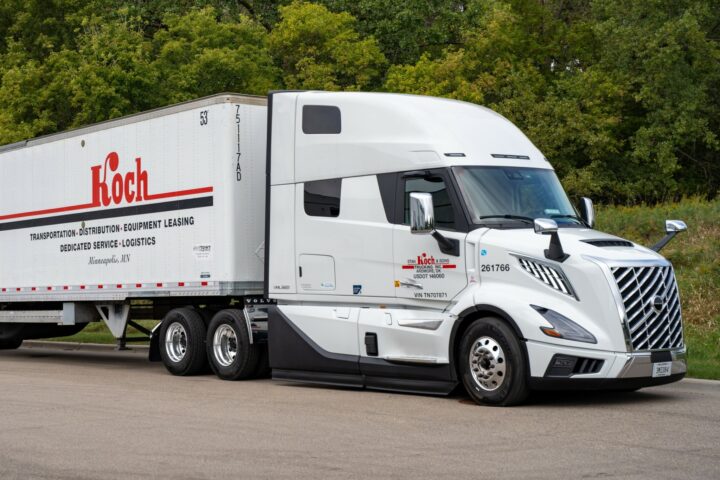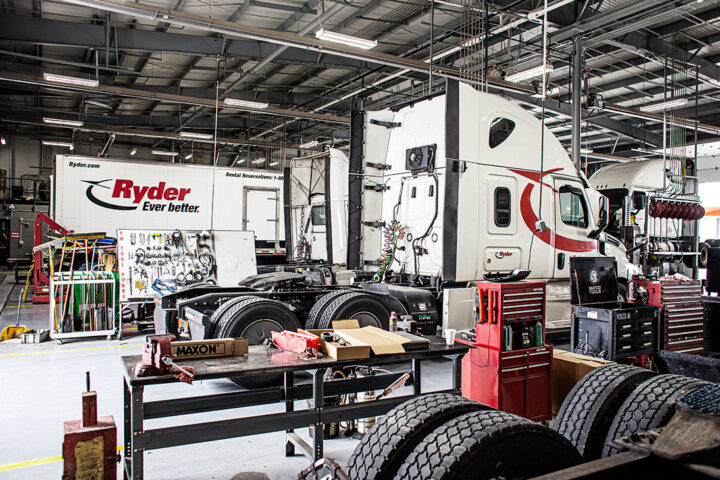You have the opportunity to transform your career in the trucking industry by honing your decisive skills. Mastering the ability to make quick and informed decisions can greatly enhance your safety, efficiency, and overall job satisfaction. In this guide, you will learn vital techniques to improve your decision-making process, handle critical situations confidently, and ultimately increase your professional opportunities. Whether you are a seasoned trucker or just starting out, developing these skills will set you apart and open doors to a more successful career.
Key Takeaways:
- Develop effective problem-solving techniques to navigate challenges in the trucking industry.
- Enhance communication skills for better interactions with clients, dispatchers, and team members.
- Focus on continuous learning and industry knowledge to stay competitive and advance your career.
Types of Decisive Skills
Your success in the trucking industry largely hinges on your ability to master a variety of decisive skills. These skills not only enhance your performance but also position you as a valuable asset to your company. Below is a breakdown of some key types of decisive skills that can elevate your career:
| Skill Type | Description |
|---|---|
| Communication Skills | Essential for effective collaboration and information sharing. |
| Problem-Solving Skills | Vital for addressing challenges on the road and within the industry. |
| Time Management Skills | Crucial for ensuring timely deliveries and efficient use of resources. |
| Technical Skills | Necessary for operating and maintaining vehicles effectively. |
| Teamwork Skills | Important for fostering collaboration among coworkers and other stakeholders. |
Knowing these skills is the first step towards enhancing your effectiveness in the trucking industry.
Communication Skills
For you to excel in the trucking industry, strong communication skills are imperative. These skills enable you to clearly convey important information to colleagues, clients, and stakeholders. Whether you are discussing delivery schedules, safety protocols, or addressing customer concerns, effective communication will ensure that all parties are on the same page and reduce the likelihood of misunderstandings.
Moreover, your ability to actively listen is just as significant as how you express your thoughts. By fostering an open dialogue, you encourage collaboration, which can lead to better decision-making processes and smoother operations. In an industry that often demands quick responses, sharp communication can set you apart as a reputable professional.
Problem-Solving Skills
You will encounter numerous challenges in the trucking industry, requiring strong problem-solving skills to navigate effectively. These skills allow you to assess situations logically and make informed decisions that can mitigate risks while ensuring operations continue smoothly. From dealing with unexpected delays to managing vehicle breakdowns, your ability to quickly devise solutions is directly linked to your success and the overall efficiency of your team.
Understanding how to approach problems not only helps in resolving issues but can also prevent them from arising in the first place. Proactive problem-solving entails recognizing potential risks and implementing strategies to minimize their impact. Whether it’s maintaining compliance with regulations, adjusting routes for traffic conditions, or ensuring safety procedures are followed, mastering this skill serves as a cornerstone in maintaining safety and productivity within the trucking field.
Tips for Developing Key Skills
Some practical strategies can help you cultivate the key skills necessary for success in the trucking industry. Focus on the following tips to enhance your skillset:
- Seek out training programs that provide hands-on experience.
- Participate in workshops and industry seminars to stay updated on trends.
- Engage with online courses to learn at your own pace.
- Practice effective communication skills both verbally and in writing.
- Embrace technology by learning about new software and systems.
Knowing these strategies can give you an edge in your pursuit of a successful career in the trucking industry.
Continuous Learning
To truly excel in your career, you must commit to continuous learning. The trucking industry is constantly evolving, and keeping your knowledge base current is imperative. You should explore various resources such as online courses, industry publications, and technical manuals. Set a goal to dedicate time each month to learning something new or enhancing your existing skills. This dedication will not only make you more competent but it can also make your resume stand out to potential employers.
Additionally, considering joining industry organizations can provide you with valuable insights and access to a wealth of information. Engaging in continuous learning helps you adapt to changes quickly and prepare for new challenges that arise, ensuring you are always ahead in your career.
Networking and Mentorship
Skills in networking and mentorship are vital for building valuable connections that can guide your career. It’s imperative to attend industry events, join local trucking associations, and participate in community outreach programs. Another important element is to find a mentor who has been in the business for a while. A mentor can provide you guidance, advice, and insight based on their own experiences, helping you navigate your career path more effectively.
Developing a robust network can open doors to job opportunities and collaborations that may not be readily available otherwise. Your connections can provide support and resources, and having trusted individuals who can vouch for your skills and character can significantly impact your career trajectory. Plus, maintaining these relationships can lead to powerful partnerships and collaborations that bring mutual benefits, making you not just a skilled professional but also a valued member of the trucking community.
Step-by-Step Guide to Skill Enhancement
After identifying the importance of skill enhancement in the trucking industry, it’s necessary to follow a structured approach to improve your qualifications. The path to becoming a more skilled professional begins with a thorough examination of your current abilities and experience. You can achieve this through a series of steps that ensure that you not only recognize your strengths but also pinpoint areas where growth is needed. Below is a guide that simplifies the process of self-assessment and goal-setting:
| Step | Description |
|---|---|
| 1. Self-Assessment | Evaluate your current skills and identify areas for improvement. |
| 2. Setting Goals | Create realistic and measurable goals for skill enhancement. |
| 3. Action Plan | Outline a plan to acquire new skills and track progress. |
| 4. Continuous Learning | Stay updated with industry trends and technology. |
Self-Assessment
If you want to elevate your career in the trucking industry, the first step is conducting a self-assessment. This involves taking an honest and detailed look at your current skill set, experience, and qualifications. You should consider the type of trucking you are involved in, such as long-haul, local delivery, or specialized freight, and assess the skills required for your specific niche. This will enable you to highlight your strengths and identify areas that need improvement, ensuring you stay competitive in the ever-evolving trucking landscape.
If you find that you are lacking certain skills, it might be helpful to seek feedback from colleagues or supervisors. They can provide insights into your performance and areas for potential growth. Additionally, utilizing online assessment tools tailored to the trucking industry can offer a structured approach to this evaluation. Aim to document your findings, as this can serve as a reference point for future development.
Setting Goals
Some of your skill enhancement journey will involve setting precise and achievable goals. Clearly defined goals play an necessary role in mapping out your route to success in the trucking industry. Focus on specific skills you want to improve or acquire and ensure that your goals are measurable, so you can track your progress. For instance, if you aim to enhance your driving skills, you might set a goal to take a defensive driving course within the next three months. Furthermore, it is necessary that you also establish a timeline for each objective, which will provide you with a framework for accountability and motivation.
Goals can vary significantly, from short-term objectives, like mastering new technology relevant to truck logistics, to long-term aspirations such as obtaining advanced certifications. By setting these targets, you not only clarify your aspirations but also ignite your motivation to push through challenges. Ensure that your goals are realistic yet challenging, facilitating continuous growth without overwhelming yourself. Keep your focus sharp, and make sure you reassess your goals periodically to adapt to new developments in your career.
Factors Influencing Career Advancement
All professionals in the trucking industry must recognize the various factors that can dramatically impact your career advancement. These factors can significantly shape your journey and opportunities within this sector. To effectively navigate your career path, consider the following:
- Industry Trends
- Personal Attributes
- Networking Opportunities
- Continued Education
- Regulatory Changes
By understanding these elements, you can enhance your ability to make informed decisions about your career. Thou must stay engaged and proactive in your approach to achieving success in the trucking industry.
Industry Trends
An awareness of industry trends is vital for anyone looking to elevate their career in the trucking sector. Technology is continually evolving, with advancements such as autonomous vehicles and innovative logistics software reshaping operations and efficiency. Keeping an eye on such trends will help you to adapt and align your skill set with the demands of the market. Moreover, consumer preferences and regulatory changes are consistently influencing the industry’s direction, which makes staying updated even more important.
As you investigate into these trends, honing skills related to sustainability and safety protocols can significantly enhance your appeal to potential employers. You should regularly engage with industry news, webinars, and networking events to remain at the leading edge of the trucking landscape.
Personal Attributes
Even with the right qualifications, your personal attributes can play a significant role in determining your career trajectory in the trucking industry. Attributes such as resilience, adaptability, and strong communication skills can enhance your potential for being noticed and promoted. Moreover, leadership capabilities are important when seeking advancements in more senior roles, as they reflect your ability to manage teams and inspire others.
Understanding your strengths and weaknesses will assist you in personal development and make you a more attractive candidate for future opportunities. Embrace qualities that showcase your commitment to the job, such as punctuality, professionalism, and a positive attitude towards teamwork and customer service. These traits are not only recognized but also highly valued in the trucking sector, where working in coordination with others is important for operational success.
Pros and Cons of Skill Development
For individuals in the trucking industry, increasing your skill set can play an crucial role in your professional journey. While the benefits often outweigh the challenges, it is important to understand the various pros and cons of skill development. This awareness can help you make informed decisions regarding your training and growth. Below is a breakdown of the advantages and disadvantages associated with improving your skills:
| Pros | Cons |
|---|---|
| Enhanced job opportunities | Initial cost of training |
| Higher salary potential | Time-consuming process |
| Greater job security | Stress from learning new information |
| Increased self-confidence | Possible physical strain |
| Networking opportunities | Balancing work and education |
| Improved safety and compliance | Risk of burnout |
Advantages of Skill Enhancement
Skill enhancement offers you several advantages, particularly within the trucking industry. By acquiring new abilities, you open the door to better job opportunities. Employers often seek candidates who demonstrate a commitment to personal and professional growth. Additionally, boosting your skill set usually correlates with a higher salary potential, as you become more valuable to your current or prospective employers.
Furthermore, by continuously developing your skills, you can attain greater job security. Industries evolve, and staying ahead of the curve with advanced skills ensures you remain relevant and competitive. The process also fosters increased self-confidence and provides you with networking opportunities, allowing you to connect with others in the field who can further aid your career development.
Potential Drawbacks
With the numerous benefits of skill enhancement, you must also acknowledge some potential drawbacks that come with this endeavor. One major challenge can be the initial cost of training and education. Investing in courses or certifications may place a temporary burden on your finances. Additionally, you might find that balancing work responsibilities with your educational pursuits creates time management issues that can add unnecessary stress to your life.
Development in any skill can also lead to physical strain, especially in the trucking industry where manual labor might be involved. Not only does it require mental adjustment, but the rigors of new training can also lead to fatigue. Furthermore, as you push yourself to learn, you may inadvertently experience a risk of burnout, particularly if you are juggling various responsibilities. It’s crucial to find a comfortable balance to ensure your skill development serves to elevate your career rather than hinder your well-being.
Resources for Further Learning
Despite the abundance of resources available, it can be challenging to identify the most effective ones to aid your growth in the trucking industry. Whether you are looking to enhance your driving skills or boost your management capabilities, there are numerous options for continuous education and training that can significantly shape your career trajectory.
Online Courses
Any individual eager to advance their career in trucking should consider enrolling in online courses that focus on various aspects of the industry. Platforms such as Coursera, Udemy, and specialized websites offer courses tailored to both new and experienced professionals. You can learn about logistics management, safety regulations, and advanced driving techniques, all from the comfort of your home. Additionally, these courses often provide certificates upon completion, which can greatly enhance your resume.
Industry Publications
While online courses are a great way to learn, staying informed about the latest trends and regulations in the trucking industry is equally important. Subscribing to industry publications such as “Transport Topics” or “Fleet Owner” will keep you in the loop with articles written by experts covering a wide range of topics. This not only broadens your knowledge but also helps you understand the challenges and opportunities present in the market today.
A consistent reading habit of these publications can provide you with insights into key challenges that others in your field are facing, as well as strategies they employ to address them. You will find valuable information on emerging technologies, regulatory changes, and market trends that can empower you to make informed decisions and remaining competitive within the trucking landscape. Additionally, many of these publications offer online forums where you can engage with other professionals, expanding your network and learning from their experiences.
Summing Up
With this in mind, enhancing your decisive skills can significantly elevate your career in the trucking industry. The ability to make sound decisions not only improves your performance on the road but also helps you navigate the complexities of logistics, compliance, and customer relations. By investing in your decision-making capabilities, you demonstrate reliability and leadership, traits that are highly valued in this fast-paced sector. You may find that as you refine these skills, you open up more opportunities for advancement and create a more rewarding professional journey.
Your journey in the trucking industry will likely present various challenges, and having strong decisive skills can be the key to overcoming them. Whether you are tackling unexpected situations on the road or making strategic choices that impact your company, your ability to think critically and decide effectively will set you apart. As you focus on developing these skills, you are not only enhancing your immediate job performance but also positioning yourself as a proactive and vital part of your organization’s success. Take charge of your career trajectory and make decisions that propel you forward.
Q: What are the key decisiveness skills needed for a successful career in the trucking industry?
A: In the trucking industry, several decisiveness skills are necessary for career advancement. First, problem-solving is vital, as truckers frequently encounter unexpected situations on the road that require quick and effective solutions. Second, communication skills play an important role; clear and concise exchanges with dispatchers, clients, and other drivers can prevent misunderstandings and enhance efficiency. Lastly, time management is necessary. Truck drivers must manage their schedules to meet delivery deadlines while adhering to regulations, ensuring they can perform their duties effectively.
Q: How can newcomers to the trucking industry develop these decisiveness skills?
A: Newcomers can enhance their decisiveness skills through a combination of education, training, and experience. Enrolling in a reputable trucking school or training program provides a foundation in the necessary technical knowledge and regulations. Additionally, gaining practical experience through internships or mentorships can expose new drivers to real-world scenarios, helping them practice problem-solving and communication. Participating in workshops or seminars focusing on time management can also provide strategies to prioritize tasks effectively while on the road.
Q: What resources are available for continued skill development in the trucking industry?
A: There are numerous resources available for ongoing skill development in the trucking industry. Many professional organizations, such as the American Trucking Associations (ATA), offer training programs, webinars, and networking opportunities to help drivers improve their skills. Online courses available through platforms like Coursera or Udemy focus on relevant topics such as logistics, supply chain management, and customer service. Additionally, joining peer groups or forums can provide practical advice and support from experienced professionals, facilitating shared learning and growth in decisiveness skills.

















